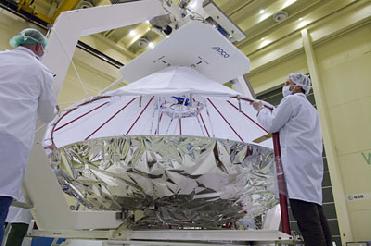
Official photo of Herschel telescope mirror
FRENCH GUIANA (BNS): The launch of European Space Agency�s Herschel and Planck spacecraft might be delayed further as experts are readying to carry out a final and independent check of all safety measures.
The mission was earlier scheduled to be launched on April 16.
The verification of operations procedures for Herschel and Planck at ESA�s European Space Operations Centre has now positively concluded, ESA said in a statement on Thursday.
However, during final checks on the spacecraft, concerns have arisen and a short delay is proposed in order to allow ESA and Arianespace to carry out a final and independent check of the safety margins, the space agency said. The final decision on the satellites� launch date will be postponed by a few days, it said.
ESA is launching the mission to study the formation of stars and galaxies and the relic radiation from the Big Bang, respectively. The two spacecraft have successfully completed their test campaigns in Europe.
Over the next few days, a panel of independent experts led by ESA Inspector General and Arianespace will carry out a final cross-check of the documentation to demonstrate that the required safety margins for the telescope are met.
The Herschel telescope mirror, the largest ever to be sent to space, will use 12 silicon carbide petals brazed together into a single piece. �The complexity of the structure and its uniqueness means great care must be taken to ensure that stresses exerted on it during launch are well understood,� said the space organisation.
The powerful telescope will enable scientists look deep into the space, at long infrared wavelengths. Herschel�s spectral coverage, which ranges from far-infrared to sub-millimetre wavelengths, will be made available for space-based observations for the first time.
The telescope will make it possible to observe and study relatively cool objects all over the universe, from our own back yard to distant galaxies, enabling us to know more about the birth and evolution of stars and galaxies.
The Planck mission will be the first European space observatory that will study the Cosmic Microwave Background (CMB) � the relic radiation from the Big Bang. It will measure tiny fluctuations in the CMB, providing sharpest picture ever of the young Universe � when it was only 380,000 years old � and zeroing-in on theories that describe its birth and evolution, the ESA said.
 Previous Article
Previous Article Next Article
Next Article













The Indian Air Force, in its flight trials evaluation report submitted before the Defence Ministry l..
view articleAn insight into the Medium Multi-Role Combat Aircraft competition...
view articleSky enthusiasts can now spot the International Space Station (ISS) commanded by Indian-American astr..
view article